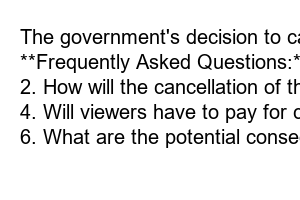TV수신료 해지
In a recent announcement, the government has decided to cancel the TV license fee, sparking both excitement and confusion among TV viewers. This bold move comes after years of debate and controversy surrounding the necessity of the license fee in the age of streaming services and digital content consumption.
**The Background of the TV License Fee:**
The TV license fee has been a longstanding source of revenue for public broadcasters, funding their programs and operations. However, with changing consumer habits and the rise of online streaming platforms, many have questioned the relevance and fairness of the fee.
**The Reason for the Cancellation:**
The cancellation of the TV license fee is seen as a response to these changing dynamics in the media landscape. By eliminating the fee, the government aims to alleviate the financial burden on TV viewers and adapt to the new ways in which people consume content.
**The Impact on Public Broadcasters:**
While the cancellation of the license fee may seem like a blow to public broadcasters, it also presents an opportunity for them to explore new revenue streams and innovate their programming. This could lead to more diverse and engaging content for viewers.
**What This Means for TV Viewers:**
For TV viewers, the cancellation of the license fee means more freedom in choosing how they access and pay for content. With the rise of streaming services and on-demand programming, viewers now have more options than ever before.
**The Future of Public Broadcasting:**
With the cancellation of the TV license fee, public broadcasters will need to adapt to survive in a competitive media landscape. By focusing on relevant and high-quality content, they can continue to attract viewers and secure funding through alternative means.
**The Public Reaction:**
The public reaction to the cancellation of the TV license fee has been mixed, with some applauding the move as a step towards modernization, while others express concern about the potential impact on the quality of public broadcasting. Only time will tell how this decision will play out in the long run.
In conclusion, the cancellation of the TV license fee marks a significant shift in the media industry and presents both challenges and opportunities for public broadcasters and TV viewers alike. While the future may be uncertain, one thing is clear – change is on the horizon for the world of television.
**Summary:**
The government’s decision to cancel the TV license fee has sparked debate and uncertainty among viewers and broadcasters alike. While this move aims to modernize the media landscape and offer more choices to consumers, it also raises questions about the future of public broadcasting and the quality of programming. Only time will tell how this decision will shape the future of television.
**Frequently Asked Questions:**
1. Will public broadcasters be able to survive without the TV license fee?
2. How will the cancellation of the fee impact the quality of programming?
3. What alternatives are available for funding public broadcasting?
4. Will viewers have to pay for content that was previously covered by the license fee?
5. How will the cancellation of the fee affect the competitiveness of public broadcasters in the digital age?
6. What are the potential consequences of this decision on the media industry as a whole?

